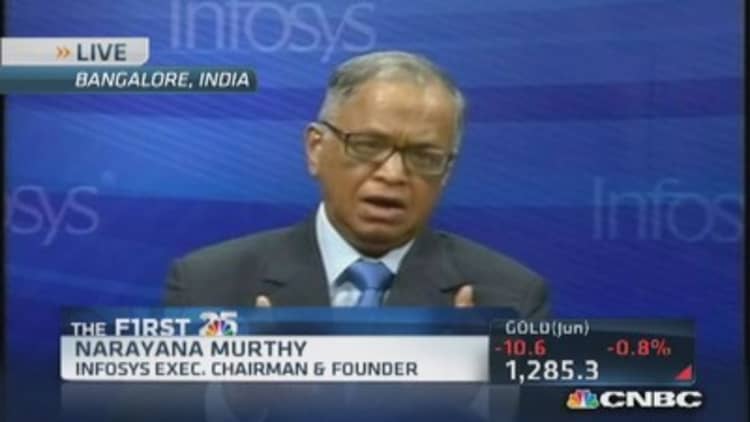
From an international billionaire who has described himself as a capitalist in mind, but a socialist at heart, N.R. Narayana Murthy—founder of India-based software and IT giant Infosys—told CNBC on May Day that "capitalism is the way forward."
"There is a realization now the only way that we can solve the problem of poverty is through the creation of jobs—jobs with good income," Murthy said Thursday. "People have realized that entrepreneurship is the best way to do it. And they also know that entrepreneurship flourishes under capitalism."
He said there's a "grudging acceptance" of capitalism, even among people who have been "somewhat cool to capitalism earlier."
Regarded as the father of India's information technology revolution, Murthy appeared on "Squawk Box" after being named No. 13 on the CNBC First 25 List of visionary leaders who shaped the world of business and finance since 1989—the year CNBC started.
More CNBC 25
Jamie Dimon breakup one of my big mistakes: Weill, No 21
This is huge for mom & pop investors: Warren Buffett, No. 6
US doesn't have a rational tax policy: Jack Welch, No. 12
Murthy helped usher in the most significant change to the management of large companies in the U.S. and Europe over the past quarter century: the outsourcing of back-office processes.
Infosys and other India-based companies have reaped the benefits. Forbes estimates Murthy's fortune at $1.7 billion.
He's now executive chairman of the company he started in 1981—with an initial $1,150 capital infusion from his computer engineer wife, Sudha.
"While we could not clearly predict where we would be, one thing we were very, very certain [of] ... seek respect from every stakeholder," Murthy said on CNBC Thursday. He added the future is bright for the software services industry.
Infosys has nearly 800 customers in 30 countries. It derives 85 percent of its revenue from North America and Europe.
—By CNBC's Matthew J. Belvedere





